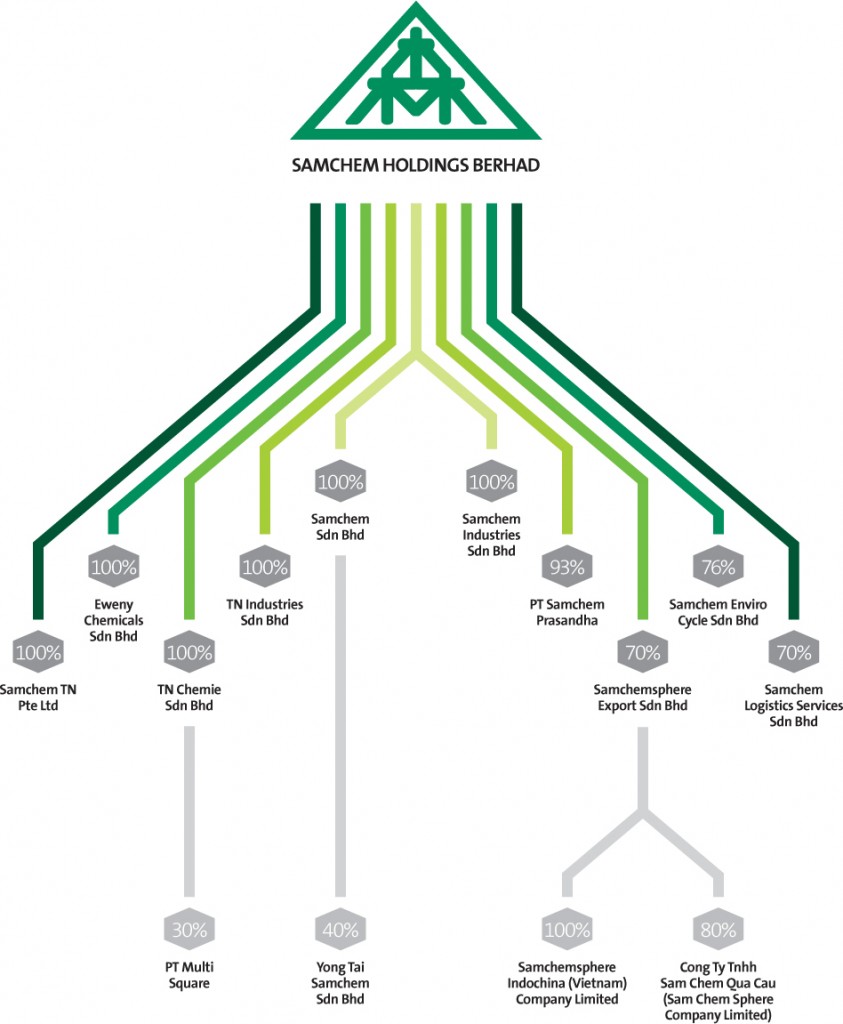Articles
Uncategorised
Group Of Companies

VeoVa™ 10 Monomer
Description
VeoVaTM 10 Monomer is the vinyl ester of VersaticTM acid 10, a synthetic saturated monocarboxylic acid with a highly branched structure containing ten carbon atoms. Its structure may be represented as:
R1 and R2 are alkyl groups containing a total of 7 carbon atoms. VeoVa 10 Monomer, a low viscosity liquid with a typical mild ester odor, is a very attractive monomer for the manufacture of polymers through reactions of the vinyl group. It imparts a combination of flexibility (medium to low Tg), hydrophobicity and very good chemical and UV resistance.
For further application and technical details of this product, please follow this link
Propylene Glycol Monomethyl Ether
| Propylene glycol monomethyl ether is a clear, liquid with an ether odor. It is completely soluble in water and has moderate volatility. Propylene glycol monomethyl ether is a oxide-based, or P-series, glycol ether. |
 |
Storage and Handling
To obtain a Material Data Sheet (MSDS or SDS) for Safe Handling Guide, please contact us at the appropriate phone number or send your Email using the Contact Us form on http://samchemprasandha.com/index.php/contact-us |
|
Product Uses
– Chemical Intermediate
– for he manufacture of propylene glycol methyl ether acetate(PMA)-Solvent
– for paint, varnishes, inks, strippers, cleaners and degreasers.-Coalescing agent
– for eater-based paint and ink to promote polymer fusion the drying process-Coating
– for automotive, architectural, industrial maintenance, wood, and coating, and metal finishing-Electronic
– to manufacture copper-clad lamination product Propylene glycol monomethyl ether is formulated into a wide of house products including:-Floor polish and related products-Paint, lacquers, varnisher, and other paint-related products-Nonstructural caulking compounds and sealants-Synthetic resin and rubber adhesives-Pesticides-Automotive cleaners-Dyes and inks
– ball point and felt-tip pens-Cleaning products for glass, ovens, hard surfaces, floor, rugs and upholstery-Laundry aids – ironing aids and dry-cleaning spot-cleaning preparations-Specialty cleaning and sanitation products
– swimming pool cleaners
|
 |
|
Cardura™ E10P Glycidyl Ester
Description
CarduraTM E10P glycidyl ester of VersaticTM Acid 10, a synthetic saturated monocarboxylic acid of highly branched C10 isomers. Its structure may be represented as:

R1 and R2 are alkyl groups. Cardura E10P glycidyl ester is a liquid product with a low viscosity, and a mild odour.
for further application and technical details of this product, please follow this link
n-Propyl Acetate
| n-Propyl acetate is a clear, volatile, mobile liquid with a characterictic odor reminiscent of acetone. It is miscible with many common solvents, e.g. alcohols, ketones, aldehydes, ethers, glycols and glycol ethers, but it is only sparingly soluble in water. |
 |
Physical and Chemical Properties
Physical State : Liquid
Color: Colorless
Odor: Fruity OdorBoiling
Point: 102°C
Freezing Point: -95°C
Vapor Pressure: 40 mmHg@29°C
Vapor Density: (air=1): 3.5
Specific Gravity (water=1): 0.9
Water Solubility: 2%
PH: N/A
Volatility: N/A
Odor Threshold: 70 mg/m3
Evaporation Rate: N/A
Coefficient of Water/Oil Distribution: N/ASolvent Solubility: alcohols, ketones, ester, hydrocarbons
|
|
Applications N_Propyl acetate is primaly intended as a solvent in the coatings and printing inks industries. Its properties are important for the manufacture and processing of numerous peoducts in these branches of industry, e.g. Its good solvent power for many resin, its high volatility, and its mild odor.Another factor of great significance in these branches of industry is that the solvent power and thinnability of n-propyl acetate are comparable to those of ethyl acetate. For instance, it dissolves many natural and synthetic resins (e.g. cellulose nitrate, scrylate, alkyd resins, rosin, plasticizers, waxes, oils and fats) and is thus an eminently suitable solvent for wood lacquers and industrial finished.The main applications for n-propyl acetate in the printing inks industry are flexographic and special screen printing inks.
|
||
 |
Hazards Identifications :
Risk phrases: 11/36
Safety phrases: (S2), S16, S26, S29,S33
|
Storage and Handling
For more informations or to obtain a Material Data Sheet (MSDS or SDS) for Safe Handling Guide, please contact us at the appropriate phone number or send your Email using the Contact Us form on http://samchemprasandha.com/index.php/contact-us

